In 2025, Product Marketing in Brazil is no longer a niche discipline. It’s a rising career path shaping how products are launched, positioned, and communicated across fast-growing markets.
But who are the professionals behind this momentum? What are they paid? And what does it take to thrive in this space?
We surveyed close to 300 PMMs across Brazil to uncover insights into their demographics, compensation, responsibilities, and more. Here's what we discovered.
Who are the people behind PMM in Brazil?
A female-majority field, with pay disparities
One of the most striking takeaways is that 76.5% of Brazilian PMMs identify as female, far outpacing tech industry norms both globally and locally. This suggests Product Marketing has become a rare space where women not only enter but thrive.
That said, the average monthly salary for women (R$9,437) remains slightly lower than that of men (R$9,827) – a gap that, while narrower than in other industries, is still significant.
This reality speaks to the need for continued work around pay equity and promotion transparency. PMMs, often skilled communicators and cross-functional influencers, are uniquely positioned to lead the way in advocating for these internal conversations.
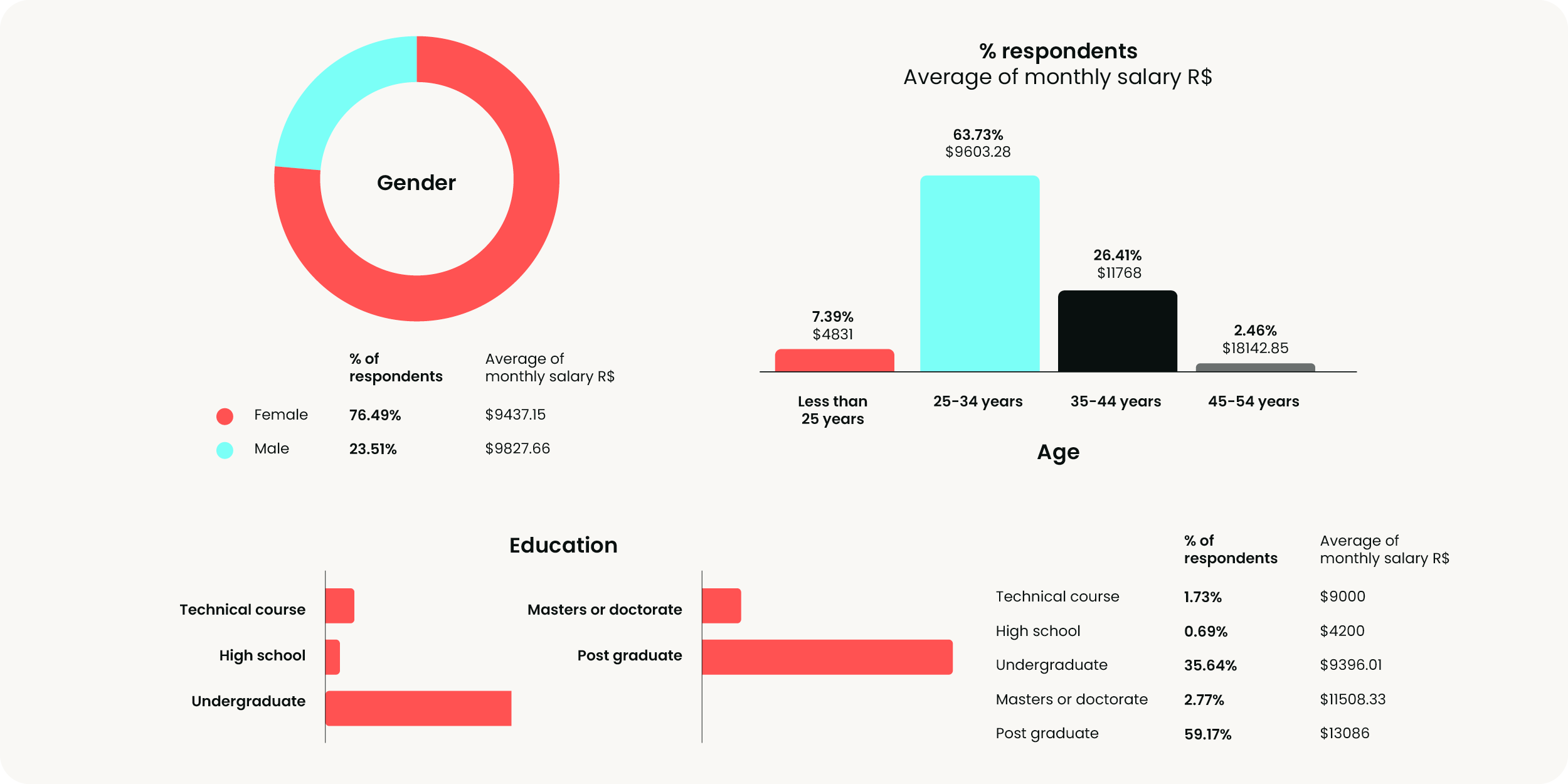
Age, experience, and long-term trajectory
The bulk of Brazil's PMM workforce is in the 25-34 age range, reflecting a field that is still relatively young but growing in sophistication. Professionals in this bracket report an average salary of R$9,600, while those aged 35-44 see a bump to R$11,768, and those over 45 command a significantly higher R$18,142.
What does this tell us? Product marketing offers a long-term growth path, not just a stepping stone to general marketing or product management. Those who invest in the discipline, through deeper strategic expertise or leadership development, can expect their compensation to reflect that seniority over time.
Education and career development
Product marketing in Brazil is intellectually demanding, and the numbers reflect that: nearly 60% of respondents hold a postgraduate degree, most often in the form of MBAs or broader specializations.
These professionals also report the highest average salary of R$13,086, indicating that education is a strong leverage point in the field.
Interestingly, those with only an undergraduate degree earn about R$9,396, while the rare few with PhDs or master’s degrees come in around R$11,508.
This suggests that while academic credentials are valuable, the real differentiator may be practical business-oriented education – a hallmark of the broader model.
Where PMMs work and how geography impacts pay
Unsurprisingly, São Paulo dominates, with nearly 49% of respondents working there with an average salary of R$12,707. The city remains the epicenter of Brazil’s tech and startup scenes. But that doesn’t mean opportunity is limited to urban centers.
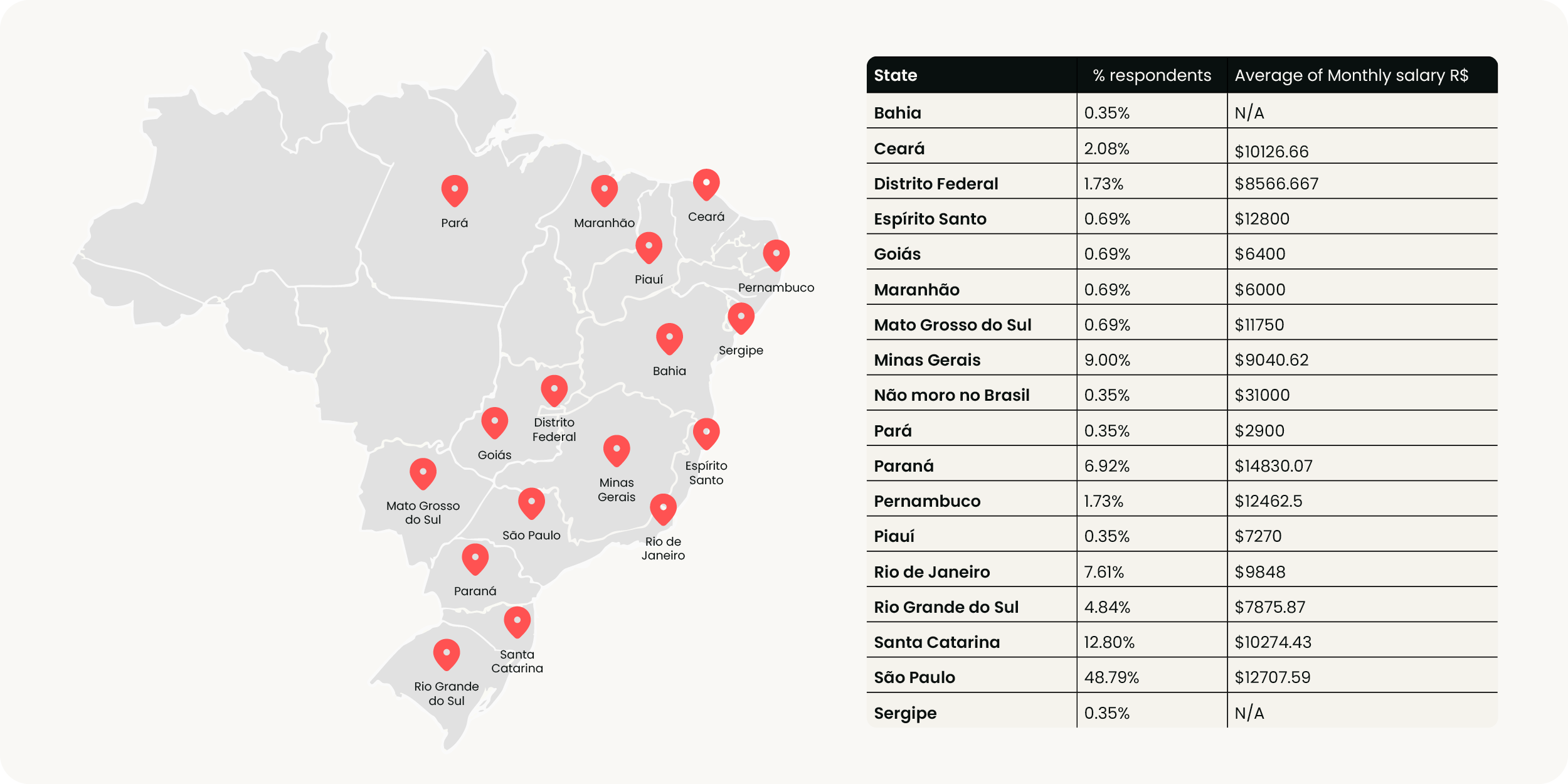
In fact, 50% of PMMs work fully remotely, with many commanding salaries equal to or higher than their in-office peers. Those working for companies without a physical office in Brazil earn an average of R$16,606 – a clear signal that global and remote work opens doors to higher pay.
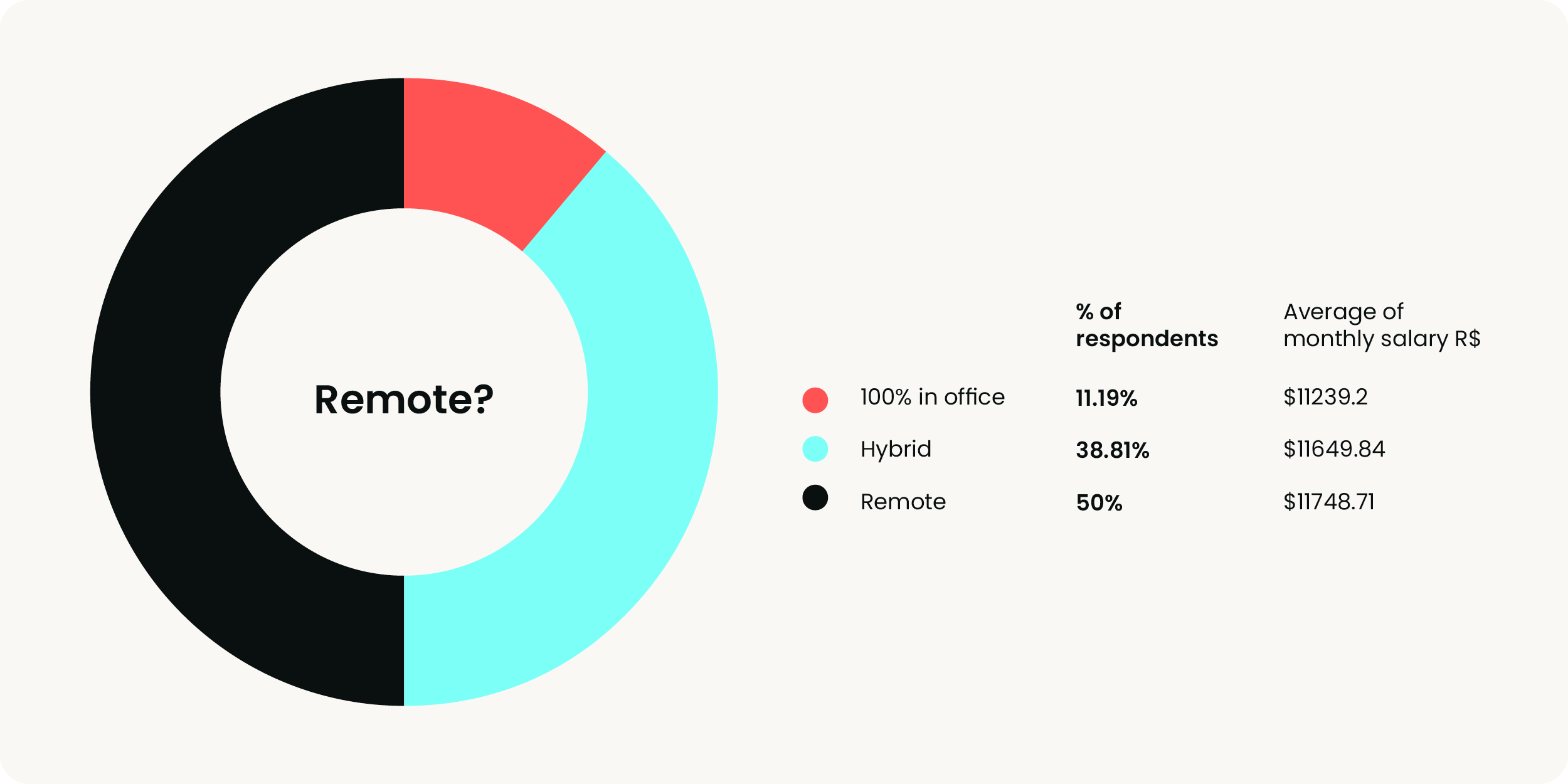
PMMs located in Santa Catarina, Paraná, and Rio de Janeiro also report competitive salaries, though the gap widens considerably in states like Goiás, Maranhão, or Pará, where roles may be scarcer or tied to smaller businesses.
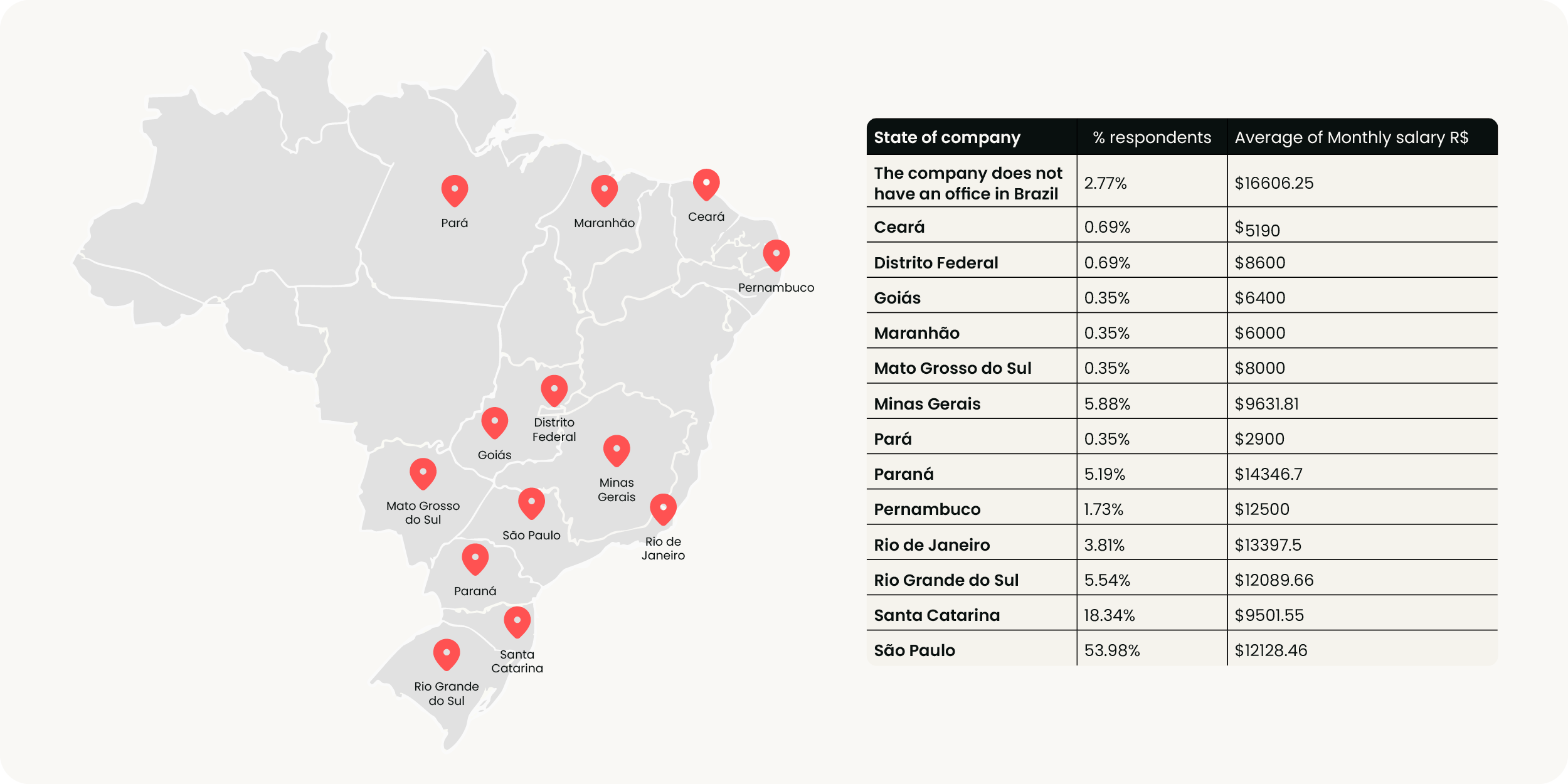
Company location, format, and stage
Location and geographic reach
One of the most important indicators of salary in PMM turns out to be the geographic scale of the company:
- PMMs at global companies (operating in multiple continents) earn the highest salaries, with an average monthly income of R$14,435.34.
- Those in LatAm-focused companies average R$11,681.52.
- Meanwhile, professionals in regional organizations (focused only on Brazil or one state) earn significantly less at R$10,253.82.
This disparity suggests that working for international companies (even remotely) provides greater compensation. PMMs in global environments are often expected to navigate more complex product strategies, cultural nuances, and market dynamics, which may explain the premium.
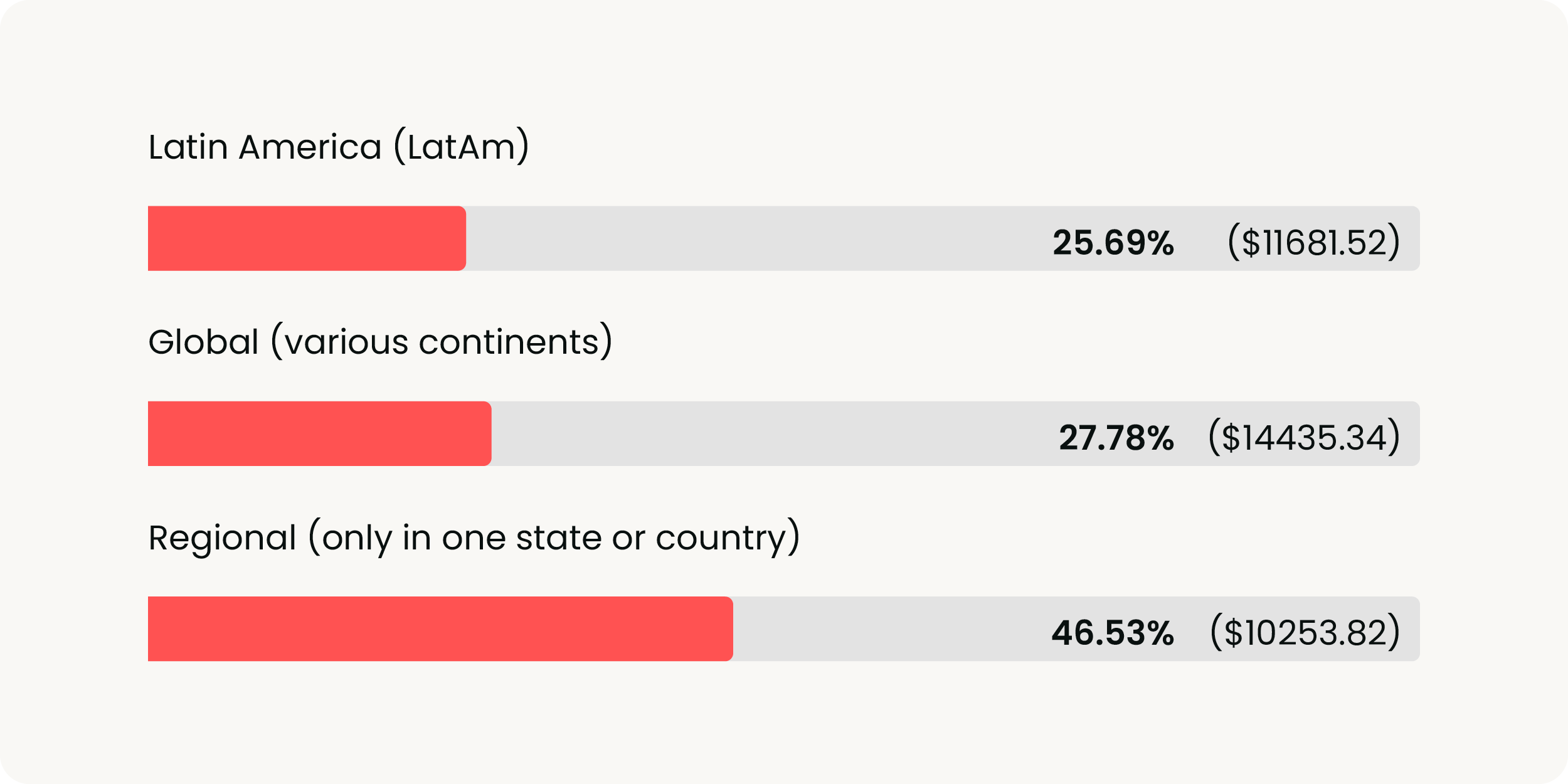
Company format
PMMs working in hybrid models (B2B + B2C) report the highest earnings. These roles likely involve more diversified customer segments and GTM strategies, which could justify higher compensation.
On the other hand, those working with government audiences (B2G) earn the least. This is expected, given slower sales cycles, less product differentiation, and fewer roles in that space.
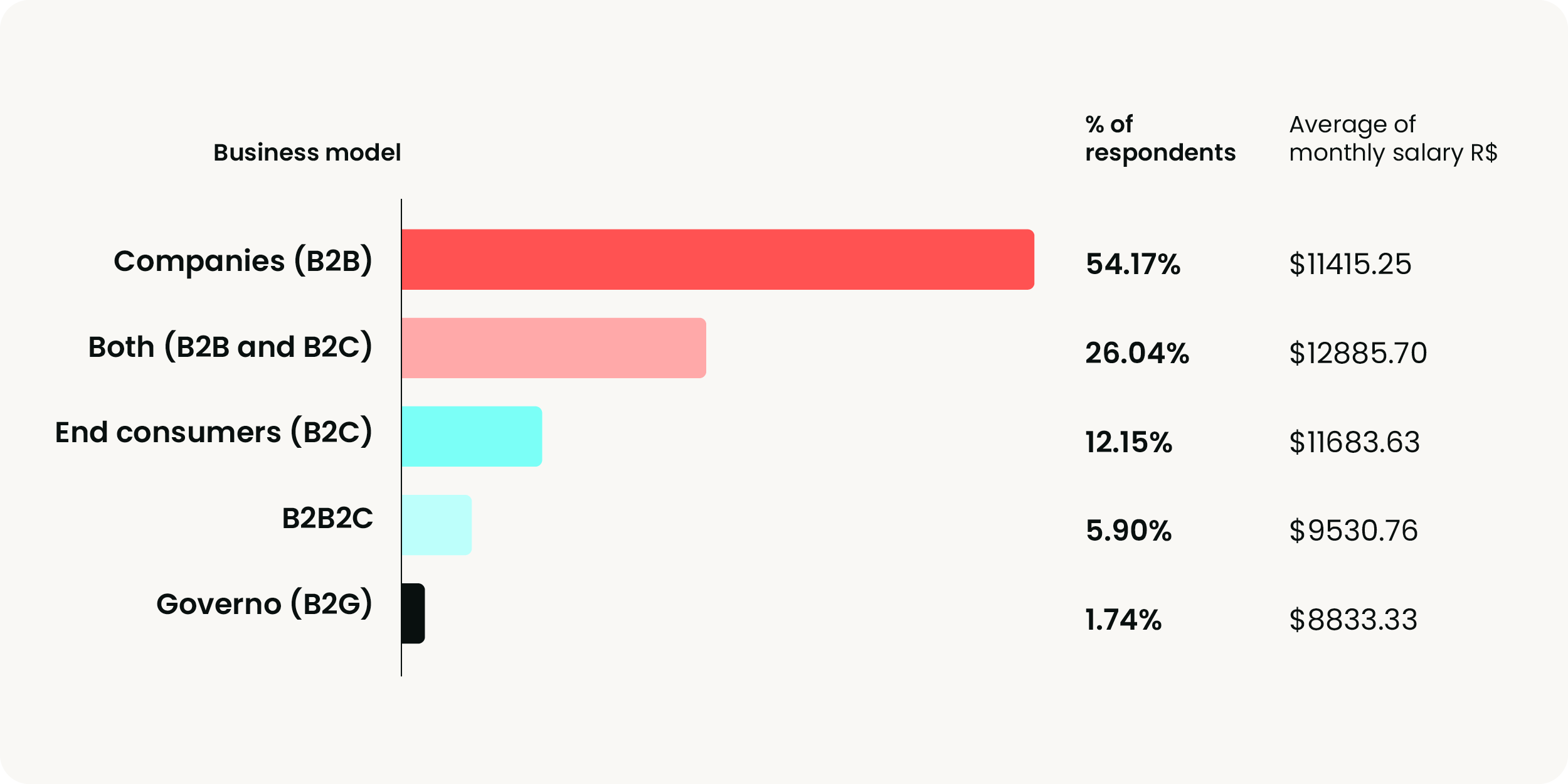
While Tech continues to be the dominant employer for PMMs in Brazil, Agribusiness surprisingly reports the highest salaries, although this may be skewed by low sample size. The Finance and Health sectors also remain solid bets for compensation.
If you're looking to transition into a new industry, aim for those that are tech-adjacent, data-driven, or innovation-heavy. PMMs in these environments tend to manage more complex lifecycles and are rewarded accordingly.
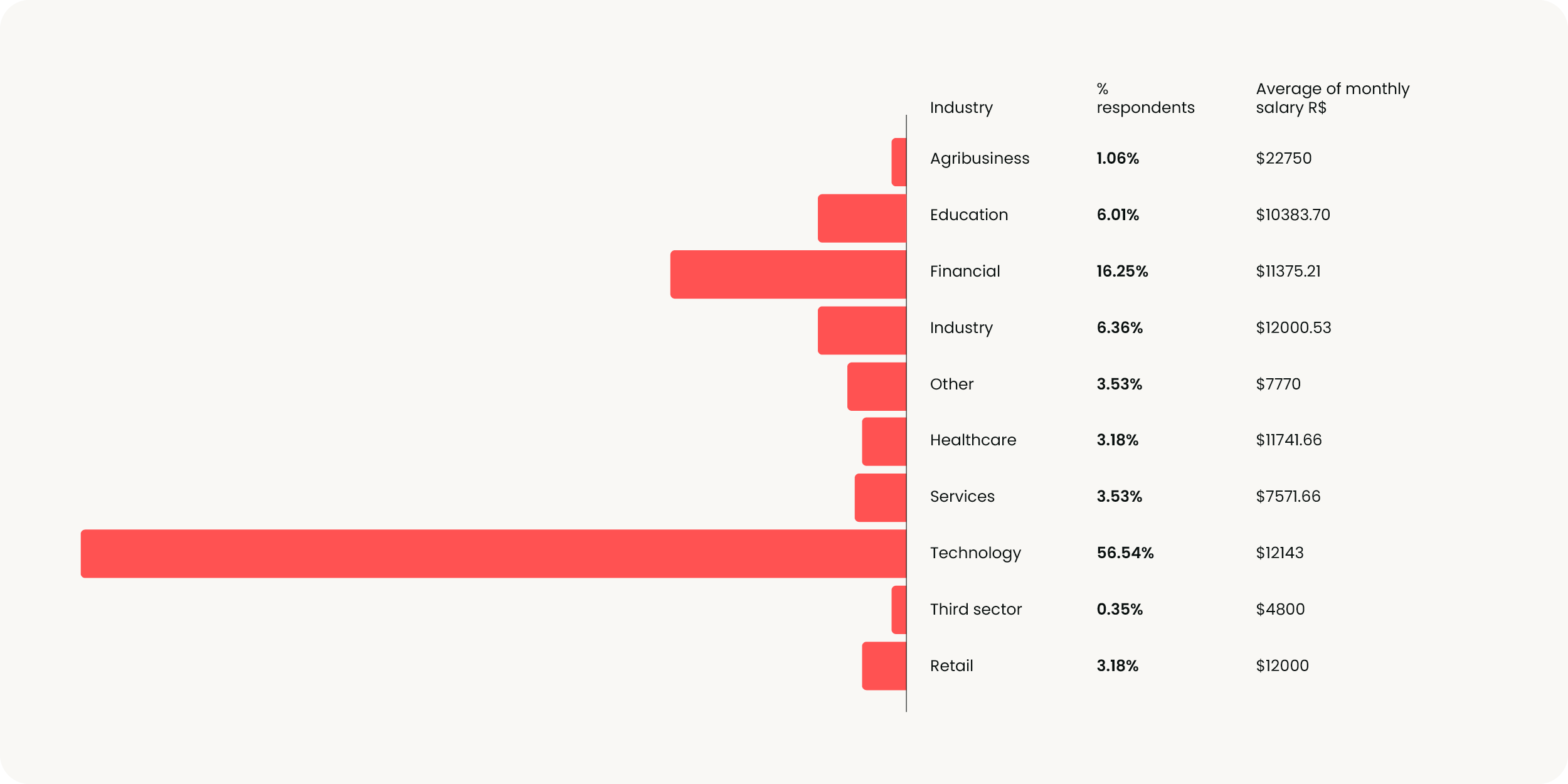
Company stage
Professionals in consolidated companies make up nearly half of all respondents and enjoy relatively high, stable salaries.
Interestingly, early-stage companies with investment offer even higher average salaries than growth-stage orgs, likely due to the smaller teams and expanded responsibilities PMMs take on early.
Startups may offer faster learning and equity, but don’t always pay well. PMMs at early-stage companies often wear multiple hats, which can justify higher salaries, but stability and benefits are typically stronger at larger firms.
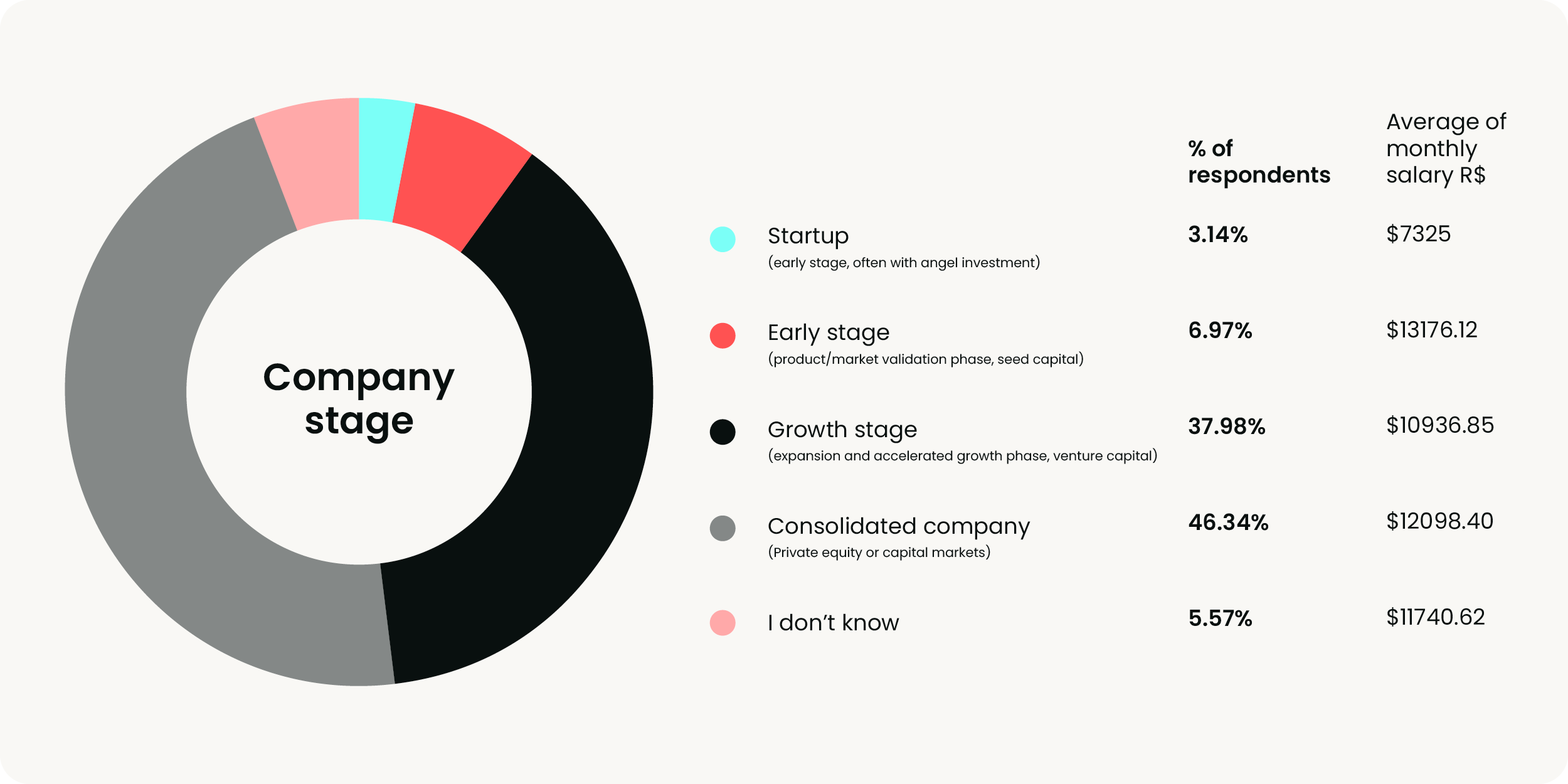
Titles, roles, and career ladders
Job titles within product marketing carry significant weight. At the entry level, junior professionals earn just over R$4,700/month, while mid-level PMMs average R$7,300. The jump to Senior brings salaries above R$10,000, and moving into Manager or Coordinator roles sees a leap to R$16,500+.
While only 1% of respondents hold Director or VP titles, they report salaries of R$31,000–32,000, suggesting that once PMMs break into executive ranks, compensation follows quickly.
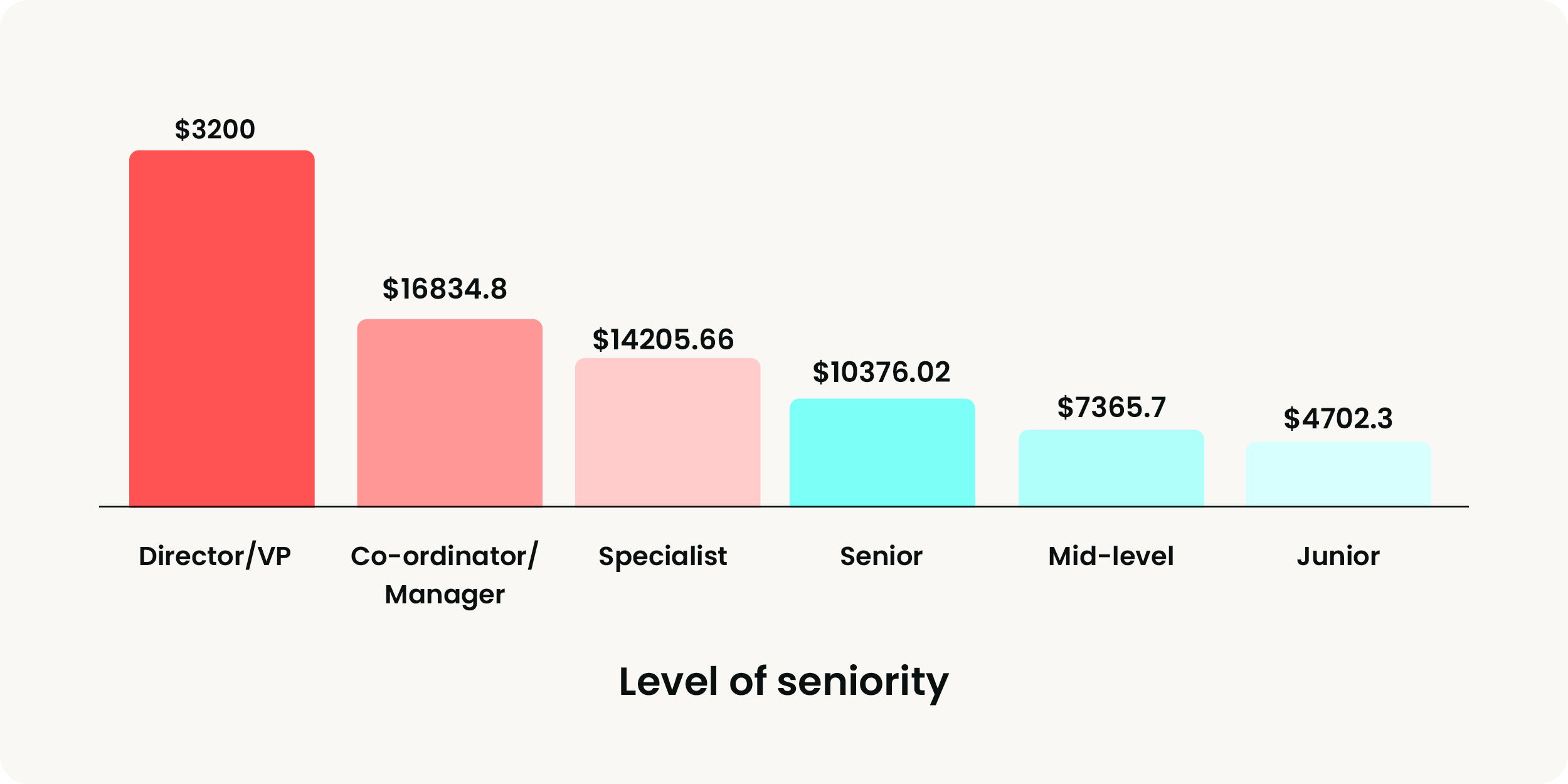
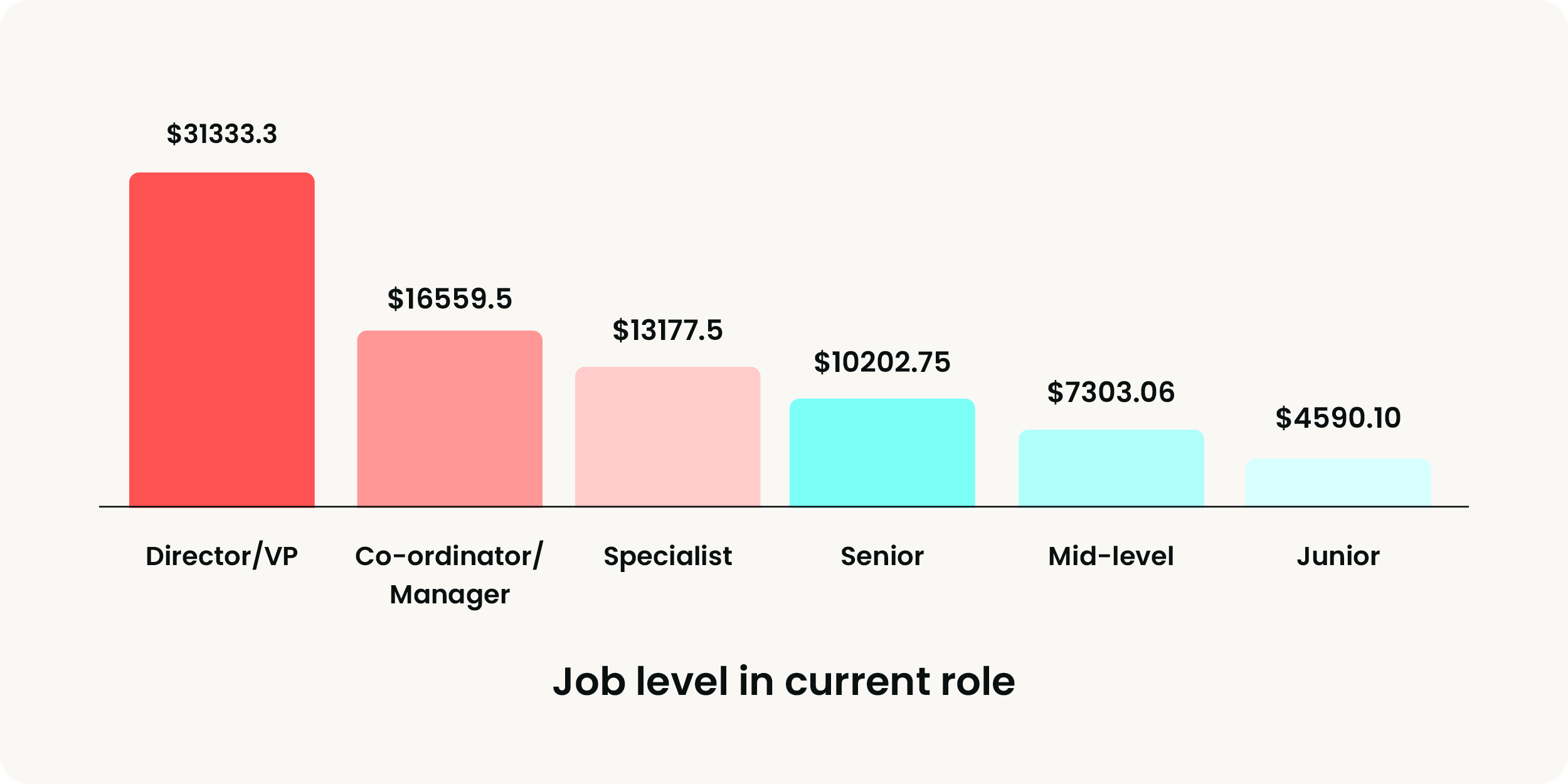
Yet the path to the top isn’t solely a function of time. Experience plays a critical role:
- PMMs with under 1 year of experience average just R$6,200
- By 3–5 years, that climbs to R$11,993
- And at 10+ years, salaries top R$16,800
This data reaffirms what many senior PMMs know: longevity and depth of strategic impact matter more than tenure alone.
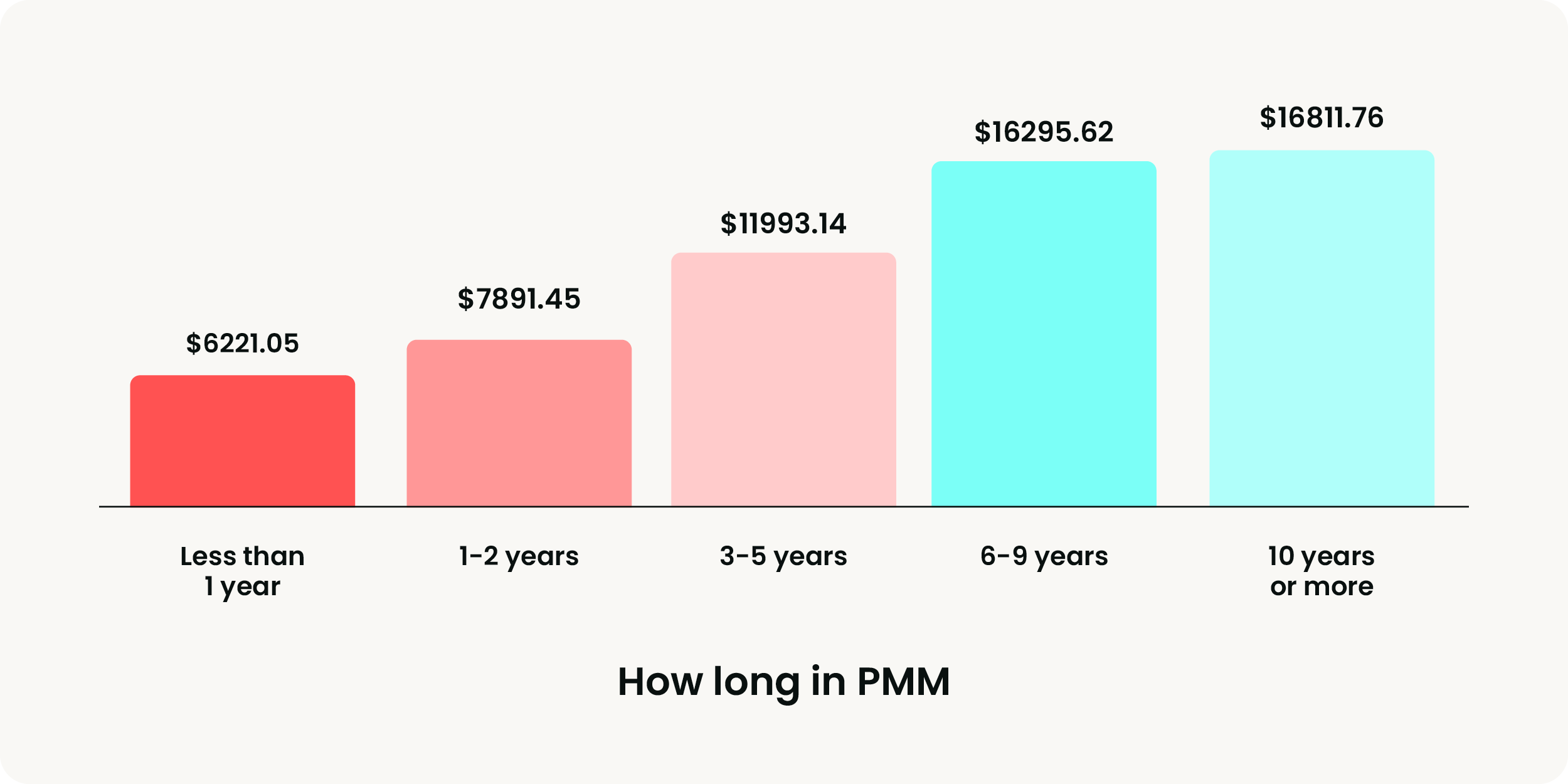
The work itself: What Brazilian PMMs actually do
The modern Brazilian PMM wears many hats. The top three responsibilities, selected by over 83% of respondents, are:
- Go-to-market (GTM) strategy
- Messaging and narrative building
- Defining product positioning and value proposition
These are core competencies of any high-functioning PMM. But what’s more revealing is what’s less common:
- Only 26% said they lead pricing and monetization strategy
- Just 38% are involved in roadmap and new market entry decisions
This suggests a divide between executional ownership and strategic influence. PMMs in Brazil are clearly owning launches and communication, but fewer are involved in product decisions that impact revenue directly.
For PMMs looking to advance, building competency in pricing, monetization, and product lifecycle management could be the key to unlocking leadership roles.
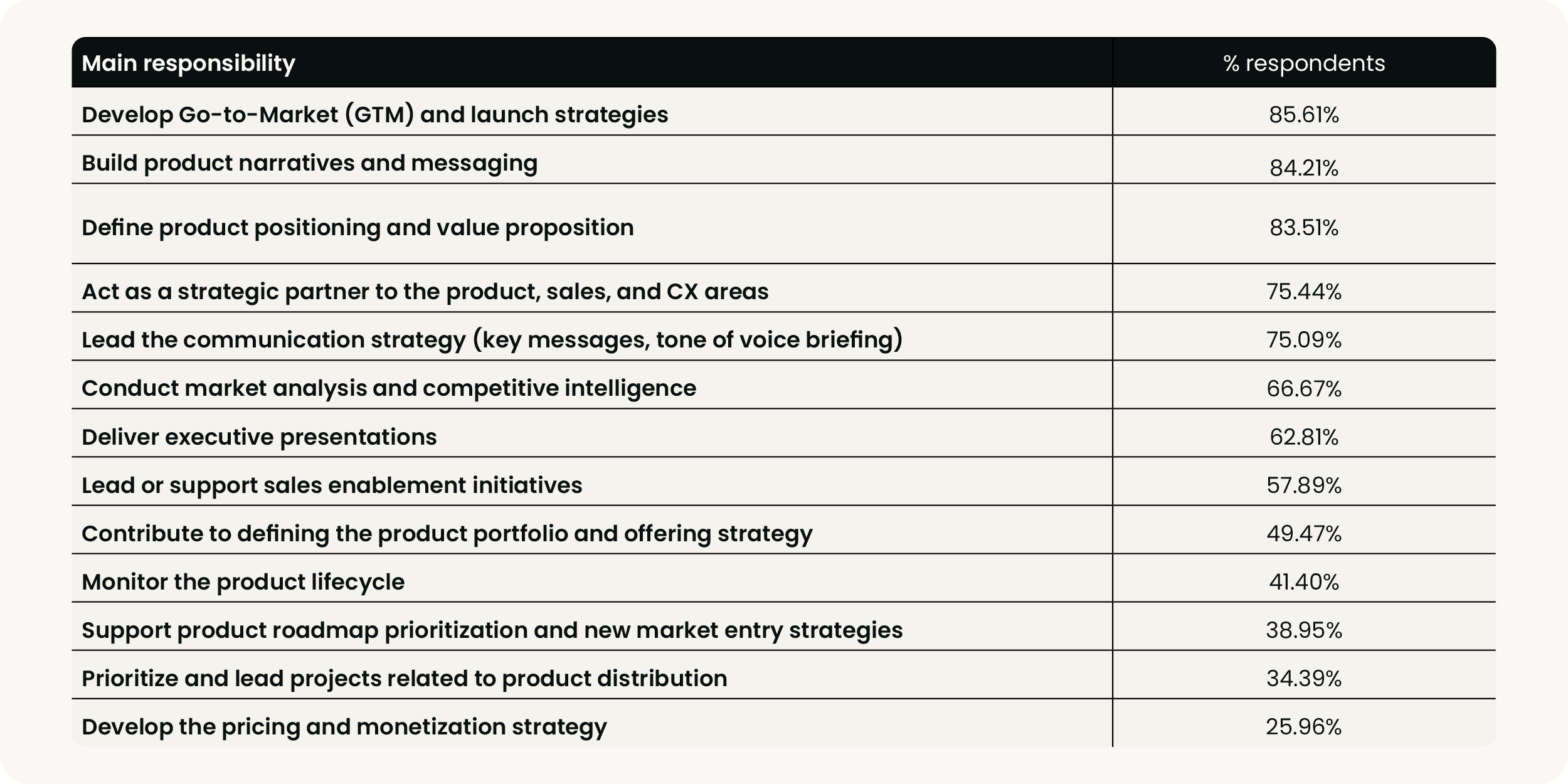
Respondents were able to choose more than one option for this question.
Diversity, equity, and inclusion
The survey also gathered data on race, disability, and LGBTQ+ identity.
- 74% of PMMs identify as white
- 17.5% as mixed race and 6.6% as Black
- Black PMMs earn ~R$9,156, compared to ~R$11,969 for white peers
- 26.3% identify as part of the LGBTQ+ community, earning ~R$9,474 compared to ~R$12,542 for non-LGBTQ+ peers
While the field is more diverse than some tech roles, pay discrepancies persist. These findings highlight the importance of active inclusion policies, mentorship for underrepresented groups, and salary transparency initiatives.
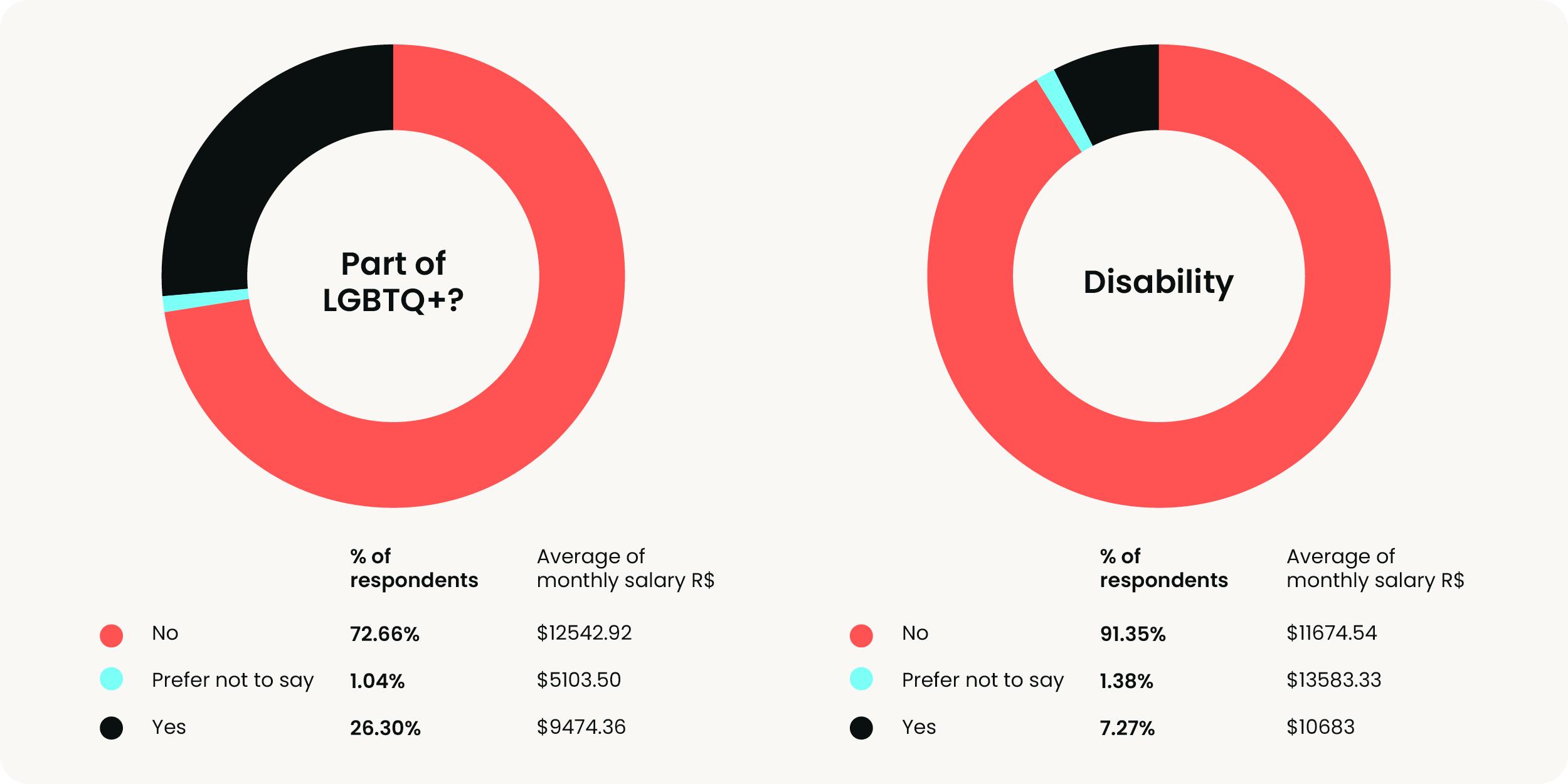
Compensation, contracting, and bonus culture
Brazilian PMMs are compensated reasonably well by national standards, with the average professional earning around R$11,000/month. But compensation varies widely based on employment model:
- CLT contracts (traditional employment) are most common (84.7%) with average pay of R$11,180
- PJ (contractor/self-employed) roles make up 14.6% of responses and offer R$14,006 on average
- A rare few freelancers report R$30,000+, likely reflecting senior consultants or those working for global clients
Over 53% of respondents receive a performance bonus, averaging R$35,152 annually. This is a significant income supplement and indicates that variable compensation is becoming a norm in PMM, especially at larger or international companies.
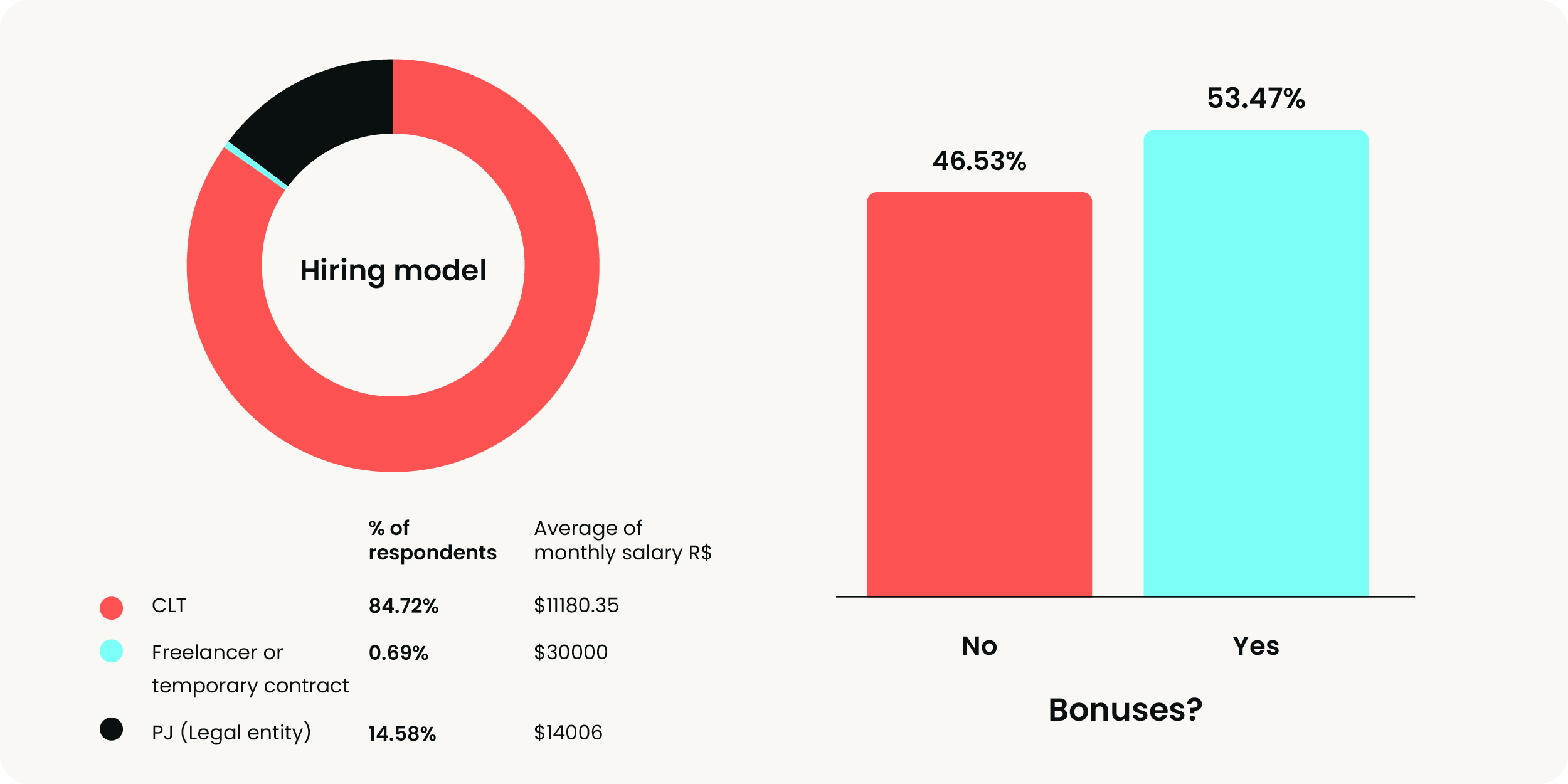
What PMMs want (besides a raise)
We asked PMMs which benefits matter most – and the results were clear:
- 90% want health insurance
- 76% prioritize dental and wellness perks
- 62% value extended parental leave
- 41% want mental health support
- Only 1.7% asked for a 4-day workweek, though this may change as flexibility culture matures
Brazilian PMMs are signaling loud and clear: benefits that support physical, mental, and family wellbeing are no longer nice-to-haves, they’re expected.
What this means for PMMs in Brazil
Product marketers in Brazil are shaping how products reach markets and resonate with customers. They are strategists, storytellers, and connectors, often doing the unseen work that turns product potential into customer value.
But the field also has growing pains: pay gaps, unequal access across regions, and underrepresentation in strategic product areas like pricing and monetization. As the discipline matures, the leadership opportunity is clear, but only if we invest in it.


















 Follow us on LinkedIn
Follow us on LinkedIn




.svg)
Start the conversation
Become a member of Product Marketing Alliance to start commenting.
Sign up now